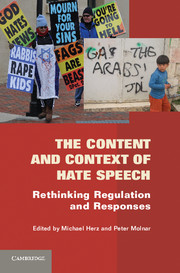Book contents
- Frontmatter
- Contents
- Contributors
- Foreword: Hate Speech and the Coming Death of the International Standard before It Was Born (Complaints of a Watchdog)
- Foreword: Hate Speech and Common Sense
- Acknowledgments
- Introduction
- Part I Overviews
- Part II Refinements and Distinctions
- Part III Equality and Fear
- Part IV International Law
- 22 Does International Law Provide for Consistent Rules on Hate Speech?
- 23 State-Sanctioned Incitement to Genocide
- 24 A Survey and Critical Analysis of Council of Europe Strategies for Countering “Hate Speech”
- 25 The American Convention on Human Rights
- 26 Orbiting Hate? Satellite Transponders and Free Expression
- Index
- References
23 - State-Sanctioned Incitement to Genocide
The Responsibility to Prevent
Published online by Cambridge University Press: 05 June 2012
- Frontmatter
- Contents
- Contributors
- Foreword: Hate Speech and the Coming Death of the International Standard before It Was Born (Complaints of a Watchdog)
- Foreword: Hate Speech and Common Sense
- Acknowledgments
- Introduction
- Part I Overviews
- Part II Refinements and Distinctions
- Part III Equality and Fear
- Part IV International Law
- 22 Does International Law Provide for Consistent Rules on Hate Speech?
- 23 State-Sanctioned Incitement to Genocide
- 24 A Survey and Critical Analysis of Council of Europe Strategies for Countering “Hate Speech”
- 25 The American Convention on Human Rights
- 26 Orbiting Hate? Satellite Transponders and Free Expression
- Index
- References
Summary
Genocide is the most destructive threat known to humankind. It is the ultimate crime against humanity – the unspeakable crime whose name one should shudder to mention; a horrific and unspeakable act whereby incitement – often sanctioned and effected by state officials themselves – transforms hatred into catastrophe.
Universal condemnation of genocide brought the international community together in 1948 to draft the Convention on the Prevention and Punishment of the Crime of Genocide. To this day, the Genocide Convention holds a unique place in international law. Its prohibition of genocide and related international obligations are recognized as compelling and overriding law, binding all states in the international community regardless of whether they signed and ratified the Convention itself or not (jus cogens). Indeed, the Convention articulates and establishes obligations owed by all members of the international community to all members of the international community (obligatio erga omnes). The objective of the Convention is as clear as it is compelling: that State Parties to the Convention are obliged to prevent and to punish genocide – the pinnacle of human criminality. The obligation to punish genocide does not extend simply to the physical acts of carrying out genocide, but also to the acts involved in the orchestration and organization of genocide – acts that create the climate of hatred necessary for the genocide to take place. Accordingly, Article 3(c) of the Convention expressly prohibits direct and public incitement to genocide. With this prohibition, the international community has recognized that incitement is both precondition to, and indicator of, genocide. Targeting incitement in the Genocide Convention speaks to both intertwined principles of a responsibility to prevent and a responsibility to punish genocide.
- Type
- Chapter
- Information
- The Content and Context of Hate SpeechRethinking Regulation and Responses, pp. 430 - 455Publisher: Cambridge University PressPrint publication year: 2012
References
- 2
- Cited by



